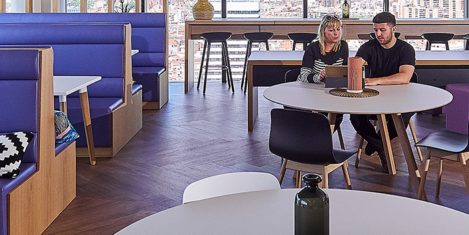July 5, 2018
Over a third of staff say employers fail to invest in next-generation workplace technology
 The majority of employees are disappointed with their company’s lack of investment in technology, and despite the fact three quarters (76 percent) want to request flexible working – almost half still don’t have the option of working more flexibly, a new report from a technology company claims. According to the survey by technology company Ingram Micro Cloud UK, in collaboration with technology company Microsoft, despite the fact that Millennials and Centennials are often thought to be the driving force behind changing workplace practices – and are often derided in popular discourse for having unreasonable and unrealistic expectations – the calls for change are coming from all segments of the workforce. However, 85 percent of Millennials admit to procuring their own workplace technologies such as instant messaging, Skype, file hosting and sharing tools (all available from Ingram Micro Cloud) that aren’t supported or provided by their employer, which raises major security issues, acco.
The majority of employees are disappointed with their company’s lack of investment in technology, and despite the fact three quarters (76 percent) want to request flexible working – almost half still don’t have the option of working more flexibly, a new report from a technology company claims. According to the survey by technology company Ingram Micro Cloud UK, in collaboration with technology company Microsoft, despite the fact that Millennials and Centennials are often thought to be the driving force behind changing workplace practices – and are often derided in popular discourse for having unreasonable and unrealistic expectations – the calls for change are coming from all segments of the workforce. However, 85 percent of Millennials admit to procuring their own workplace technologies such as instant messaging, Skype, file hosting and sharing tools (all available from Ingram Micro Cloud) that aren’t supported or provided by their employer, which raises major security issues, acco.








 Employers with over 250 employees are more likely to have a significant absence issue among staff says new research from Group Risk Development (GRiD). According to HR decision makers companies with over 250 employees have the highest absence rates – averaging 7.5 days per year yet micro businesses with between 1-9 staff only see their staff take an average of 2.8 days absence per year. Five per cent of HR decision makers also admitted to not recording or monitoring absence at all, although this is more prevalent amongst SMEs (6 percent) than those with over 250 employees (1 percent).
Employers with over 250 employees are more likely to have a significant absence issue among staff says new research from Group Risk Development (GRiD). According to HR decision makers companies with over 250 employees have the highest absence rates – averaging 7.5 days per year yet micro businesses with between 1-9 staff only see their staff take an average of 2.8 days absence per year. Five per cent of HR decision makers also admitted to not recording or monitoring absence at all, although this is more prevalent amongst SMEs (6 percent) than those with over 250 employees (1 percent). 


 A major global report has revealed a lack of confidence in data is limiting corporate success in the emerging era of robotics and automation. The global research launched by Qlik, has revealed an escalating skills gap preventing business decision-makers asking the right questions of data and machines. Despite
A major global report has revealed a lack of confidence in data is limiting corporate success in the emerging era of robotics and automation. The global research launched by Qlik, has revealed an escalating skills gap preventing business decision-makers asking the right questions of data and machines. Despite 




 The way to measure an employer’s speed of innovation includes how they find talent, their appraisal process, how employees recommend the organisation they work for to others, and how much employees collaborate, claims a new European study by Cornerstone OnDemand and IDC. “Future Culture: Building a Culture of Innovation in the Age of Digital Transformation” explores the relationship between European organisations’ speed of innovation and talent management, with the research showing that firms with a steady stream of new products and services are more likely to have an ongoing feedback process with employees, rather than an annual performance review, while organisations with a slower rate of innovation often use coaching and mentoring to develop employees.
The way to measure an employer’s speed of innovation includes how they find talent, their appraisal process, how employees recommend the organisation they work for to others, and how much employees collaborate, claims a new European study by Cornerstone OnDemand and IDC. “Future Culture: Building a Culture of Innovation in the Age of Digital Transformation” explores the relationship between European organisations’ speed of innovation and talent management, with the research showing that firms with a steady stream of new products and services are more likely to have an ongoing feedback process with employees, rather than an annual performance review, while organisations with a slower rate of innovation often use coaching and mentoring to develop employees.
 The digital era, ageing populations, skills shortages, and unpredictable political and economic contexts are persuading multinationals to focus more on mobile talent, new ways of working and assessing the cost of expatriate packages for international employees that are critical to the future of work. This is according to Mercer’s 24th annual Cost of Living Survey which reveals that factors such as instability of housing markets and fluctuating inflation, currencies and prices for goods and services, are impacting the cost of doing business in various cities around the world. UK cities have significantly risen in the ranking this year.
The digital era, ageing populations, skills shortages, and unpredictable political and economic contexts are persuading multinationals to focus more on mobile talent, new ways of working and assessing the cost of expatriate packages for international employees that are critical to the future of work. This is according to Mercer’s 24th annual Cost of Living Survey which reveals that factors such as instability of housing markets and fluctuating inflation, currencies and prices for goods and services, are impacting the cost of doing business in various cities around the world. UK cities have significantly risen in the ranking this year. 














July 5, 2018
Why a Google office simply does not work for everybody 0
by Dr Caroline M. Burns • Comment, Facilities management, Technology, Workplace design
(more…)